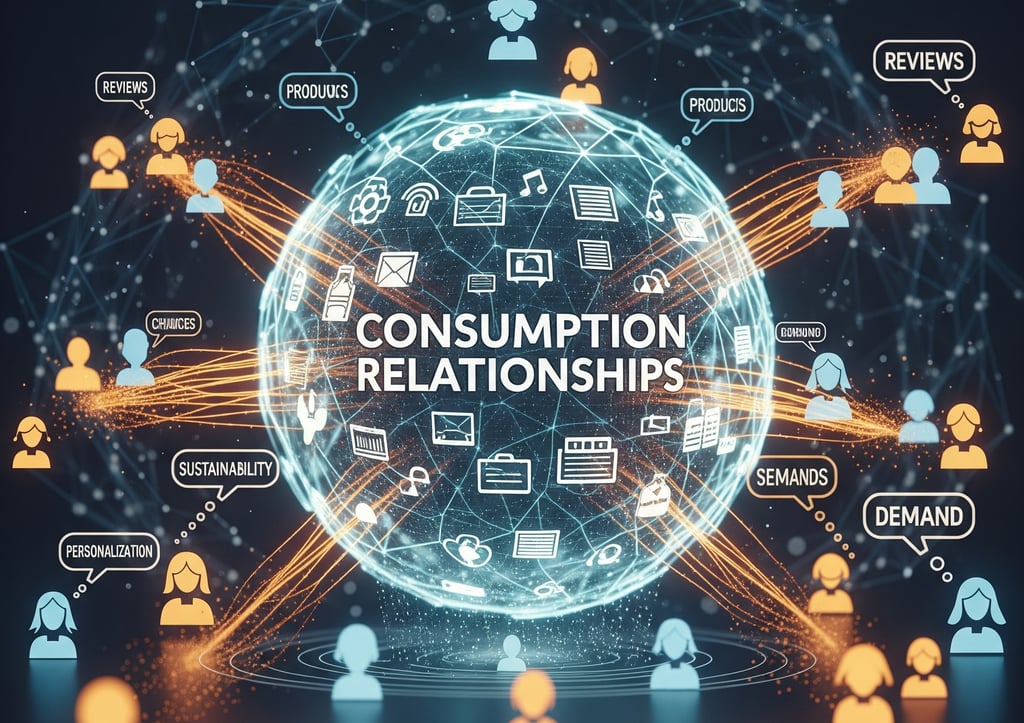The Power of the Market: Consumers in Control of the Consumer Experience
If price and product were once the main decision-making factors, now it's the consumer experience that determines winners and losers. How does this affect your company, and what strategies should you adopt?
DIGITAL TRANSFORMATION JOURNEY
8/31/20254 min read


The Empowered Consumer: Why Customer Experience is the New Battleground for Brands
The time when companies dictated the rules and consumers simply accepted what was offered is long gone. Today, at the center stage of the market is the empowered consumer, who doesn't just buy products or services but actively demands and shapes their consumption experience. Thanks to the abundance of information, ease of comparison, and the power of social media, consumers have become the driving force behind innovation and quality, compelling companies to rethink their strategies and put the customer at the heart of everything. This article explores how the consumer took control and the impact of this shift on businesses, drawing parallels with the past and envisioning a future where the consumer's voice echoes louder than ever.
The Rise of the Empowered Consumer
Various factors have contributed to the transfer of power from the producer to the consumer: advanced technology, increasing global connectivity, and changing behaviors over time are some of the variables that have significantly impacted this landscape.
Access to Information: The internet and smartphones have placed a universe of information into consumers' hands. Before any purchase, it's possible to research reviews, compare prices, check a brand's reputation, and even watch tutorials. This transparency reduces information asymmetry and gives the consumer unprecedented bargaining power.
Review Platforms and Social Media: "Word-of-mouth" has gained a megaphone. A bad experience can go viral in minutes, damaging a brand's reputation. Similarly, an exceptional experience can generate loyal advocates who organically promote the brand. Review sites like TripAdvisor and the social media platforms themselves are arenas where consumers exert their power, not just to express frustrations, but also to celebrate brands that excel.
Unlimited Options: Globalization and e-commerce have exponentially multiplied the options for products and services. If a company doesn't offer the desired experience, it's easy to find a competitor who does, often with just a few clicks. This not only increases competition but also raises consumer expectations, making them increasingly demanding regarding quality and variety.
The Customer Experience as a Competitive Differentiator
In a market saturated with similar products, Customer Experience (CX) has ceased to be a differentiator and has become an imperative. Today's consumer doesn't just seek a quality product at a good price; they seek convenience, personalization, empathetic service, and efficient after-sales support. The customer experience expands to encompass every interaction, and companies that manage to create memorable and personalized moments have an unparalleled competitive advantage.
The companies that thrive are those that understand that every touchpoint in the customer journey—from initial research to post-purchase support—is an opportunity to build loyalty or lose it. This means:
Personalization: Consumers expect brands to know them and offer products and communications relevant to their needs and preferences. With data analytics and sophisticated algorithms, companies can anticipate consumer needs and offer service that not only meets but exceeds expectations.
Omnichannel: The experience must be fluid and consistent, regardless of the channel (physical store, website, app, social media, phone). Consumers expect a smooth transition between different means of communication and interaction.
Agility and Convenience: Quick responses, uncomplicated processes, and flexible delivery options are highly valued. In an era where everything happens at an accelerated pace, consumers value not only speed but also ease of use.
Transparency and Ethics: Purpose-driven brands that demonstrate social and environmental responsibility gain the preference of an increasingly conscious public. This environment of positive corporate ethics directly reflects consumers' choices and strengthens brand loyalty.
The Impact on the Value Chain and Product Development
Consumer control extends across the entire value chain. Companies can no longer afford to develop products or services in isolation. Customer feedback has become an essential compass: every opinion collected is an opportunity for learning and improvement, creating a continuous cycle of refinement that can be the difference between market success and failure.
Co-creation: Many companies involve consumers in the product development process, from idea conception to beta testing, ensuring that what is being created truly meets market needs. This approach strengthens the brand relationship and creates a sense of belonging among consumers.
Continuous Improvement: Reviews, comments, and usage behavior data are constantly monitored to identify points for improvement in products, services, and processes. Companies that adopt a data-driven mindset are a step ahead, quickly adapting to changes in consumer preferences.
Demand for Sustainability and Ethics: The growing concern with environmental and social issues leads consumers to demand more ethical and sustainable practices from brands, influencing the entire supply chain. Commitment to sustainability is no longer just an option; it has become a requirement for companies that wish to be relevant and respected.
Conclusion: Navigating the Era of the Sovereign Consumer
Market power is undeniably in the hands of consumers. They are the new "kings," capable of boosting or bringing down brands with the power of their choice and their voice. For businesses, this means the focus must shift from the product to the experience. Investing in technology to personalize service, actively listening to feedback, being transparent, and building authentic relationships are the pillars for thriving in this new era. It's a call to action for companies to re-evaluate their business models and the experiences they offer, because relevance in today's market is a game to be played with the consumer in mind.
Brands that recognize and embrace the power of the consumer not only survive but flourish, transforming every interaction into an opportunity to strengthen bonds and build a loyal customer base. Is your company ready to yield control and allow the consumer to guide your journey? The time to act is now, because the change is not just on the horizon; it is already underway.
Innovation
Technology and Digital Transformation.
contact us
Apprenticeship
© 2025 - 2026. All rights reserved.

